Wenwen Wang
Can Vision Replace Text in Working Memory? Evidence from Spatial n-Back in Vision-Language Models
Feb 04, 2026Abstract:Working memory is a central component of intelligent behavior, providing a dynamic workspace for maintaining and updating task-relevant information. Recent work has used n-back tasks to probe working-memory-like behavior in large language models, but it is unclear whether the same probe elicits comparable computations when information is carried in a visual rather than textual code in vision-language models. We evaluate Qwen2.5 and Qwen2.5-VL on a controlled spatial n-back task presented as matched text-rendered or image-rendered grids. Across conditions, models show reliably higher accuracy and d' with text than with vision. To interpret these differences at the process level, we use trial-wise log-probability evidence and find that nominal 2/3-back often fails to reflect the instructed lag and instead aligns with a recency-locked comparison. We further show that grid size alters recent-repeat structure in the stimulus stream, thereby changing interference and error patterns. These results motivate computation-sensitive interpretations of multimodal working memory.
Revisiting Data Auditing in Large Vision-Language Models
Apr 25, 2025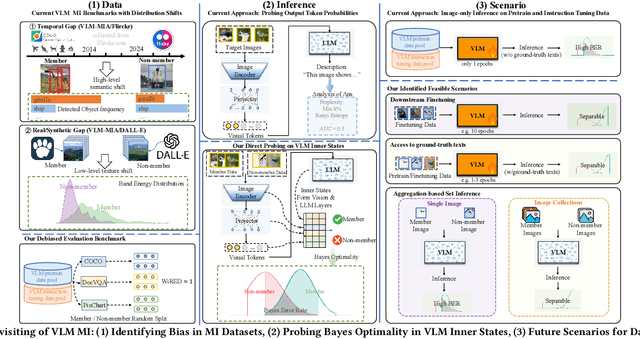
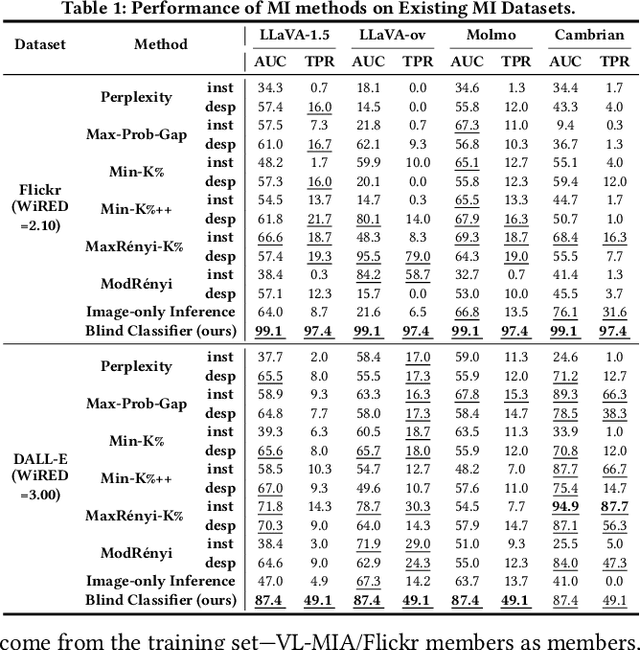
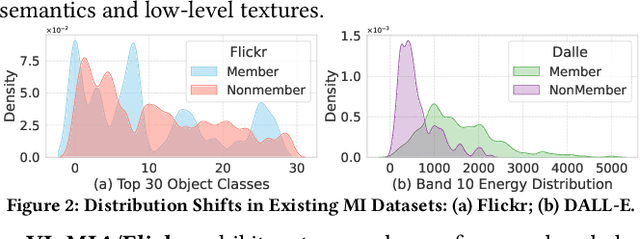
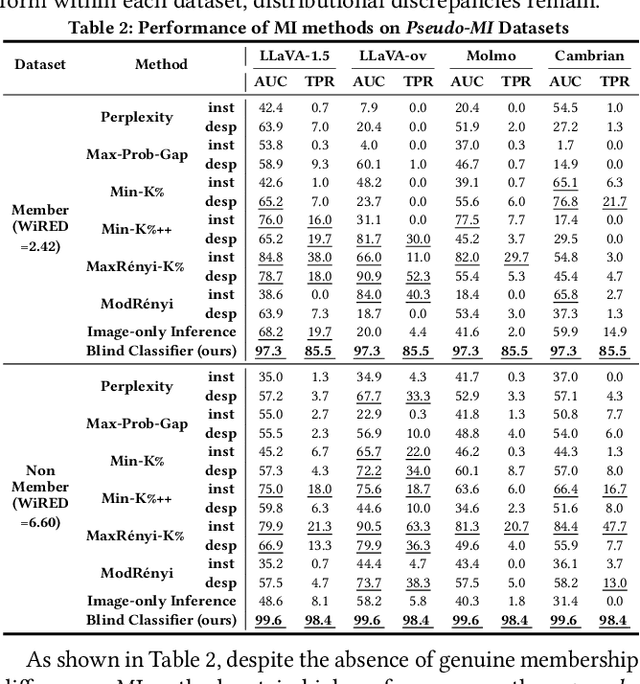
Abstract:With the surge of large language models (LLMs), Large Vision-Language Models (VLMs)--which integrate vision encoders with LLMs for accurate visual grounding--have shown great potential in tasks like generalist agents and robotic control. However, VLMs are typically trained on massive web-scraped images, raising concerns over copyright infringement and privacy violations, and making data auditing increasingly urgent. Membership inference (MI), which determines whether a sample was used in training, has emerged as a key auditing technique, with promising results on open-source VLMs like LLaVA (AUC > 80%). In this work, we revisit these advances and uncover a critical issue: current MI benchmarks suffer from distribution shifts between member and non-member images, introducing shortcut cues that inflate MI performance. We further analyze the nature of these shifts and propose a principled metric based on optimal transport to quantify the distribution discrepancy. To evaluate MI in realistic settings, we construct new benchmarks with i.i.d. member and non-member images. Existing MI methods fail under these unbiased conditions, performing only marginally better than chance. Further, we explore the theoretical upper bound of MI by probing the Bayes Optimality within the VLM's embedding space and find the irreducible error rate remains high. Despite this pessimistic outlook, we analyze why MI for VLMs is particularly challenging and identify three practical scenarios--fine-tuning, access to ground-truth texts, and set-based inference--where auditing becomes feasible. Our study presents a systematic view of the limits and opportunities of MI for VLMs, providing guidance for future efforts in trustworthy data auditing.
RGAR: Recurrence Generation-augmented Retrieval for Factual-aware Medical Question Answering
Feb 19, 2025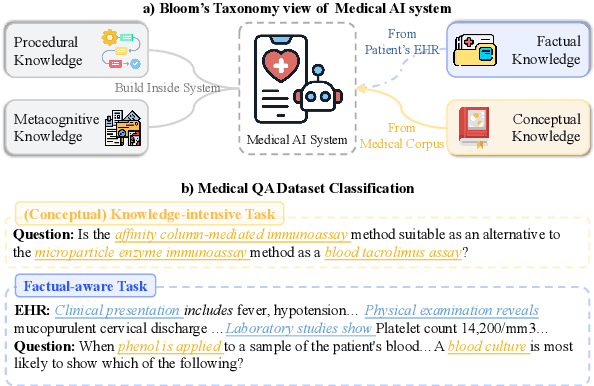
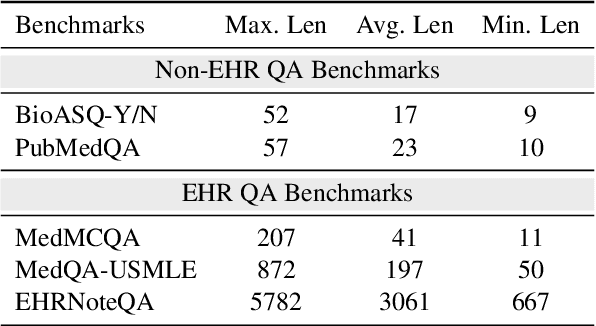
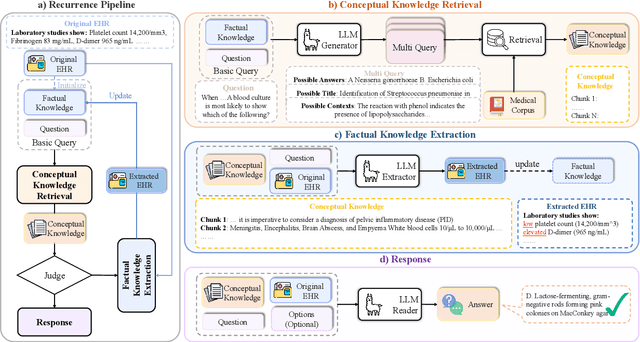

Abstract:Medical question answering requires extensive access to specialized conceptual knowledge. The current paradigm, Retrieval-Augmented Generation (RAG), acquires expertise medical knowledge through large-scale corpus retrieval and uses this knowledge to guide a general-purpose large language model (LLM) for generating answers. However, existing retrieval approaches often overlook the importance of factual knowledge, which limits the relevance of retrieved conceptual knowledge and restricts its applicability in real-world scenarios, such as clinical decision-making based on Electronic Health Records (EHRs). This paper introduces RGAR, a recurrence generation-augmented retrieval framework that retrieves both relevant factual and conceptual knowledge from dual sources (i.e., EHRs and the corpus), allowing them to interact and refine each another. Through extensive evaluation across three factual-aware medical question answering benchmarks, RGAR establishes a new state-of-the-art performance among medical RAG systems. Notably, the Llama-3.1-8B-Instruct model with RGAR surpasses the considerably larger, RAG-enhanced GPT-3.5. Our findings demonstrate the benefit of extracting factual knowledge for retrieval, which consistently yields improved generation quality.
Efficient and Effective Model Extraction
Sep 24, 2024



Abstract:Model extraction aims to create a functionally similar copy from a machine learning as a service (MLaaS) API with minimal overhead, typically for illicit profit or as a precursor to further attacks, posing a significant threat to the MLaaS ecosystem. However, recent studies have shown that model extraction is highly inefficient, particularly when the target task distribution is unavailable. In such cases, even substantially increasing the attack budget fails to produce a sufficiently similar replica, reducing the adversary's motivation to pursue extraction attacks. In this paper, we revisit the elementary design choices throughout the extraction lifecycle. We propose an embarrassingly simple yet dramatically effective algorithm, Efficient and Effective Model Extraction (E3), focusing on both query preparation and training routine. E3 achieves superior generalization compared to state-of-the-art methods while minimizing computational costs. For instance, with only 0.005 times the query budget and less than 0.2 times the runtime, E3 outperforms classical generative model based data-free model extraction by an absolute accuracy improvement of over 50% on CIFAR-10. Our findings underscore the persistent threat posed by model extraction and suggest that it could serve as a valuable benchmarking algorithm for future security evaluations.
 Add to Chrome
Add to Chrome Add to Firefox
Add to Firefox Add to Edge
Add to Edge